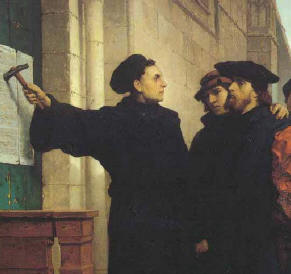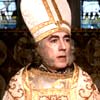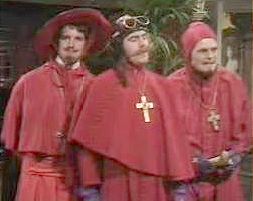 Conservative members of America's largest Lutheran denomination announced that they are splitting from the Chicago-based Evangelical Lutheran Church in America, making it the second mainline Protestant church to undergo a major schism over the issue of homosexuality and related matters of biblical authority.
Conservative members of America's largest Lutheran denomination announced that they are splitting from the Chicago-based Evangelical Lutheran Church in America, making it the second mainline Protestant church to undergo a major schism over the issue of homosexuality and related matters of biblical authority. The U.S. Episcopal Church has experienced a similar split, with whole dioceses attempting to leave, new Anglican churches formed and a series of property fights in the years since the 2003 consecration of Bishop V. Gene Robinson of New Hampshire.
On Wednesday, an 11-member steering committee of Lutheran CORE (Coalition for Renewal), meeting in New Brighton, Minn., said it cannot remain inside the 4.7-million-member ELCA after the denomination agreed at its August churchwide assembly in Minneapolis to ordain partnered gay clergy.
That decision, CORE said in a statement, created "a biblical and theological crisis throughout the ELCA and conflict in local congregations."
"We are not leaving the ELCA. The ELCA has left us," said Ryan Schwarz, a steering committee member from the Lutheran Church of the Redeemer in McLean, Va. "A lot of people who are planning to leave are telling us, 'We need you to form a new body that is like a traditional church body.' "
Financing will not be a problem for the yet-to-be-named Lutheran synod, which expects to triple or quadruple its $100,000 annual budget.
"Money has been pouring in since the churchwide assembly," Mr. Schwarz said. "We received more in contributions in the July-to-September quarter than the first six months combined. People are being incredibly generous."
In contrast, the ELCA's board of directors this week cut $7.7 million from its 2010 budget, eliminating 40 positions, though six of them already were vacant. Church officials said the cuts were results of the poor economy and conservative congregations that are withholding their funds out of disagreement with the denomination's direction.
Each CORE church would have to take steps individually to leave the ELCA and join the new synod. CORE has about 86 member churches and claims more than 300 other churches and groups as affiliates.
CORE's announcement stems from a Sept. 25-26 gathering in Fishers, Ind., that drew 1,200 like-minded Lutherans and culminated in a decision to work toward a "possible reconfiguration of North American Lutheranism."
CORE will not join forces with the Milwaukee-based Wisconsin Evangelical Lutheran Synod (WELS) or the St. Louis-based Lutheran Church-Missouri Synod (LCMS) partly because neither ordains women. CORE allows female clergy.
Nor will it merge with the Lutheran Congregations in Mission for Christ (LCMC), another breakaway group of 249 congregations, 23 of which have joined the churchwide assembly since August.
The Rev. David Baer, a CORE spokesman, said LCMC's structure is a bit too loose for many CORE congregations.
ELCA spokesman John Brooks said 87 out of 10,300 congregations have taken the first of a required two votes to leave the denomination, and 28 failed to muster the necessary two-thirds majority. Five have left the ELCA since August.
"This news from Lutheran CORE was expected," he said. "We know it takes hard work to organize a new church body. ... There has always been a place in the ELCA for all people despite our differences on various issues."

 It was the last Sunday service at Christ Church. Unable to go "further in a church that continued in a false gospel," the entire congregation, including the rector and church leaders, will sever ties with the national Episcopal Church and reform under a new name: New Hope Anglican Church.
It was the last Sunday service at Christ Church. Unable to go "further in a church that continued in a false gospel," the entire congregation, including the rector and church leaders, will sever ties with the national Episcopal Church and reform under a new name: New Hope Anglican Church.  The archbishop of Canterbury said Friday he will not reverse his decision to exclude a gay U.S. bishop from joining other bishops at a global Anglican gathering next year.
The archbishop of Canterbury said Friday he will not reverse his decision to exclude a gay U.S. bishop from joining other bishops at a global Anglican gathering next year. Episcopal delegates Tuesday snubbed Anglican leaders' request to temporarily stop electing openly gay bishops, a vote that prompted the church's leader to call a special session in hopes of reaching a compromise to preserve fragile Anglican unity. The vote by the Episcopal House of Deputies came just hours before Presbyterians, at a separate meeting, approved a plan to let local congregations install gay ministers if they wish.
Episcopal delegates Tuesday snubbed Anglican leaders' request to temporarily stop electing openly gay bishops, a vote that prompted the church's leader to call a special session in hopes of reaching a compromise to preserve fragile Anglican unity. The vote by the Episcopal House of Deputies came just hours before Presbyterians, at a separate meeting, approved a plan to let local congregations install gay ministers if they wish.